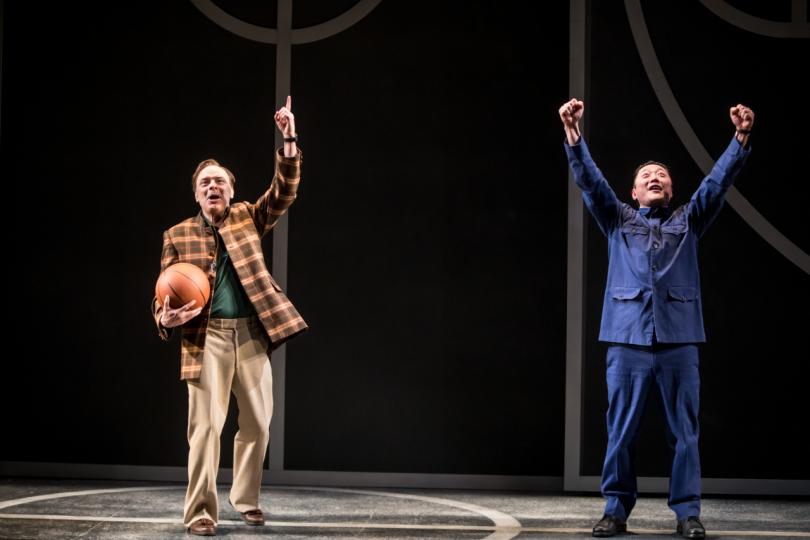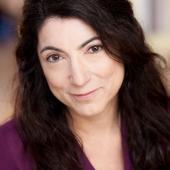Secrets, Lies, and Basketball Diplomacy

“Growing up, you did not want to be someone. You wanted to be the person three people behind someone, because ‘being someone’ could get you killed.” It is Beijing in 1971. The speaker is Wen Chang (Kurt Kwan), a young interpreter called up, we soon learn, from brutal forced labor to assist an American basketball coach from the University of San Francisco. The coach, foul-mouthed Saul Slezak (Lee Sellars), has been brought to Beijing to help train the Chinese basketball team.
The Chinese love basketball. It is the most popular sport among Chinese youth. Back in 1971, when China was still in the throes of the Cultural Revolution, basketball diplomacy, alongside the better known “ping pong diplomacy,” played a role in the thawing of U.S.-China relations. “The Great Leap” takes place in part during that time, and in part in 1989. The second date, of course, was the year of the Tiananmen Square protests and massacre.
The Great Leap has the kind of richly intricate, suspenseful plot that cannot be explored in greater detail without divulging important points. I’ll try and tread carefully. Suffice it to say there is a family story, woven together brilliantly with a historical-political drama. (It is also very funny when it wants to be.)
When we first see Saul and Wen Chang together, it almost seems -for the first few moments- like we are watching 1970’s stereotypes: the ugly American, insensitive to cultural difference, who ignorantly assumes that the Chinese have only just now discovered basketball; and the diligent, self-effacing, emotion-less “Communist Chinese” male. But that is playwright Lauren Yee teasing us. The caricatures dissolve and we quickly discover characters who are complex and who each have a subtle and complicated story to tell.
As for how long basketball's been played in China, as Wen Chang explains, it goes back over 100 years. Missionaries brought the game to China only a few years after it was invented. As Helen Gao writes “Until the NBA arrived in the early 1990s, basketball had come to feel so intrinsically Chinese, most people do not even associate it with America.” (Helen Gao, “From Mao Zedong to Jeremy Lin: Why Basketball is China’s Biggest Sport,” The Atlantic, Feb. 22, 2012). Saul sees basketball as an inherently “American” game, one that teaches competition and that sorts out the champions from “the losers”. That the Chinese Communist party under Mao continued to support the game, because they saw it as a sport that teaches cooperation and the subordination of the individual to the group (or collective welfare) is simply unfathomable to him.
For Wen Chang, by contrast, basketball allows him the freedom and spontaneity that is denied elsewhere in his life. It is at the same time a space in which he can blend in and hide. Wen Chang, like a good defender, is at all times alert to everything and everyone around him: staying in the background, he keeps one eye on the ball, and one eye on the other players.
Playwright Lauren Yee draws both humor and pathos from the clash of cultures, and especially from Wen Cheng’s elegant civilizing translations of Saul’s foul-mouthed coaching taunts. When Saul tries to startle and to provoke Wen Chang, Wen Chang responds with courtesy and unflappable calmness. At one point, Saul scolds Wen Chang for not more aggressively taunting the opposition when they shoot free throws. “It is not my turn,” Wen Chang responds. Saul’s answer: “It is always your turn, every time you are on that court!” Wen Chang turns to us and remarks: “Such an American way of thinking! I had been waiting for things my whole life.”
Eventually a true if improbable mentorship develops between the two men, and before he leaves for America, Saul encourages Wen Cheng to step up and demand to replace him as coach for the Beijing team -- since, as Saul’s adopted mentee, he must be the most qualified. If Wen Cheng steps up, it is not because he’s driven by ambition -–he would prefer to remain invisible – but rather by a burning desire never to go back to the misery of his former life.
The play is expertly structured; Yee is masterful at creating powerfully theatrical transitions. From here, she fast-forwards us to 1989; initially, we’re back in San Francisco. Saul is preparing to return to Beijing, this time with his own (SFU) team for an exhibition match. He is confronted, and hounded, by Chinese-American teenager. Manford Lum (Lawrence Kao, making a sensational debut), whose only friend is his (foster) “cousin” Connie (Leah Anderson). Manford badgers Saul to let him play point guard in the Beijing game. He insists he will not take no for an answer, even if the gatekeeper is an old bulldog like Saul and even if Manford is still in high school and under 6 feet, short by basketball standards. Eventually, “the kid” as Saul starts calling him, wears Saul out. Manford talks a mile a minute; almost impossibly, he is even cockier than Saul: “I will win you games! I will score you points … I am quick, I am relentless. I am the most relentless person you have ever met and if you have met someone more relentless than me, tell me, tell me, and I will meet them and I will find a way to become even more relentless than them.” Kao as Manford leaves the coach- and the audience- breathless.
And so Saul does, ultimately, relent, but he remains concerned about Manford’s overzealousness and impatience. Whatever he says to the contrary, he knows, from painful experience, that there is such a thing as taking a turn too soon. It turns out it was rashness that cost Saul his career as a player. Like Connie, he tries to teach Manford that he needs to pay attention and stay alert to everything that’s going on around him. he needs to know when it is and it isn’t his turn. Of course, Saul - or rather Yee - isn’t just talking about basketball here.
Yee adroitly exploits the familiar microcosm-macrocosm technique customary to sports narratives. When the characters talk about a game, their words carry resonances far beyond the sport, extending to personal choices, politics, ethics. Yee uses this technique to develop powerful questions about history and individual moral agency. In the play’s second act, during the return to Beijing, she deepens and expands the notion of “taking one’s turn” into a profound meditation on the breadth and limitations of personal responsibility. The effect at times is dazzling.
Director Desdemona Chiang keeps the pace tight and makes suburb use of Sara Ryung Clement’s elegant minimalist set. The actors, Kao in particular, use their physical performance skills to create the illusions of a basketball court and a Chinatown alleyway. (Clement only uses realistic scenery pieces to evoke Wen Chang’s modest Beijing apartment.) The four-member cast is suburb: Kurt Kwan’s textured portrayal of Wen Cheng reveals the character’s practice of making himself invisible. We watch his eyes light up as he loses himself for a moment in the excitement of the game or in a rare romantic memory, then catch himself and his face straightens. Kwan lets Wen Chang’s “rehabilitation” inform his every word and gesture. It’s an thrilling, beautifully-crafted performance. Lawrence Kao brings an irresistible – and indeed “relentless” -- energy to Manford, and Lee Sellars takes the role as Saul, one which could easily have come off as cheesy, and gives it all the depth and multi-dimensionality that Yee intends. Sellars and Kwan are both seasoned comic actors; in the early scenes where Saul and Wen Chang banter, they are very, very funny. And Leah Anderson is honest and compelling in the small role of Manford’s “cousin” Connie.
The setting of contemporary urban China is one we don’t get to see dramatized often enough, especially on the main stages of our major local venues. That’s just one thing that makes The Great Leap (another) excellent choice by the Guthrie for its 2018-2019 season. Seriously, don’t miss this one.
Performances of The Great Leap continue at The Guthrie through February 10, 2019. Tickets are available at https://www.guthrietheater.org/shows-and-tickets/, or by calling 612-377-2224 or 1-877-447-8243 (toll-free).




